
GEOMETRIC AND FUNCTIONAL ANALYSIS
Scope & Guideline
Pioneering Insights in Mathematical Research
Introduction
Aims and Scopes
- Geometric Analysis:
Studies the properties of geometric structures through the lens of analysis, including the examination of metrics, curvature, and geometric flows. - Functional Analysis:
Explores the properties of function spaces, operators, and their applications in various mathematical contexts, particularly in relation to geometric structures. - Topology and Geometry:
Investigates topological aspects of geometric objects, including homotopy, homology, and the study of manifolds and their properties. - Dynamics and Ergodic Theory:
Examines dynamical systems within geometric contexts, focusing on invariant measures, stability, and the long-term behavior of trajectories. - Algebraic Geometry:
Applies techniques from algebraic geometry to study complex structures and their applications in geometric analysis. - Differential Geometry:
Focuses on differentiable manifolds and the study of geometric structures defined by differential equations. - Geometric Group Theory:
Analyzes groups through their geometric properties, particularly in relation to spaces they act upon.
Trending and Emerging
- Geometric Group Theory:
An increase in studies related to geometric group theory, focusing on the interactions between group theory and geometric structures, has been observed, indicating a growing interest in this area. - Higher Dimensional Geometry:
Research on higher-dimensional manifolds and their properties is trending, showcasing the complexities and unique features that arise in higher dimensions. - Nonlinear Dynamics and Geometry:
There is a rising focus on nonlinear dynamics within geometric contexts, emphasizing the interplay between dynamical systems and geometric structures. - Spectral Theory on Geometric Spaces:
An emerging interest in the spectral properties of differential operators defined on various geometric objects is evident, reflecting a trend towards understanding the relationship between geometry and spectral theory. - Affine and Symplectic Geometry:
The exploration of affine and symplectic structures is gaining prominence, highlighting their applications in both pure and applied mathematics. - Metric Geometry and Its Applications:
The application of metric geometry to various mathematical problems is increasingly common, indicating a trend towards utilizing geometric insights in broader contexts.
Declining or Waning
- Classical Differential Equations:
There has been a noticeable decline in articles focused on classical differential equations and their geometric implications, as newer approaches and more complex systems gain traction. - Traditional Algebraic Techniques:
Research relying heavily on classical algebraic methods appears to be less frequent, suggesting a shift towards more geometric or computational approaches. - Elementary Topological Methods:
Simple topological techniques and results are being overshadowed by more advanced and nuanced methods, indicating a shift in the sophistication of research. - Local Analysis of Manifolds:
The focus on localized geometric analysis is diminishing, with a growing interest in global properties and their implications.
Similar Journals

PUBLICATIONES MATHEMATICAE DEBRECEN
Elevating Knowledge in Mathematics Since 1997Publicationes Mathematicae Debrecen is a renowned international journal published by the University of Debrecen, Institute of Mathematics, situated in Hungary. This journal, with both ISSN 0033-3883 and E-ISSN 2064-2849, has established itself in the field of mathematics since its inception, with coverage extending from 1997 to 2024. Recognized for its rigorous academic standards, it currently holds a Q3 ranking in the mathematics (miscellaneous) category for 2023 and ranks at the 42nd percentile among general mathematics journals in Scopus. Publicationes Mathematicae Debrecen aims to disseminate high-quality research across various areas of mathematics, contributing to the advancement of knowledge and practice in this dynamic field. Although it is not an open-access journal, its readers can access a wealth of scholarly work that addresses both theoretical and applied mathematical issues, making it an invaluable resource for researchers, professionals, and students alike.

Milan Journal of Mathematics
Enriching mathematical discourse for future generations.Milan Journal of Mathematics is a prestigious academic publication dedicated to advancing the field of mathematics, particularly in the miscellaneous areas of the discipline. Published by SPRINGER BASEL AG in Switzerland, this journal has established a strong impact in the academic community, noted for its Q1 ranking in Mathematics and achieving a commendable 80th percentile in the Scopus rankings. With an ISSN of 1424-9286 and E-ISSN 1424-9294, the journal serves as a crucial platform for researchers and scholars to disseminate their findings and engage with cutting-edge mathematical theories and applications. Although not an Open Access publication, it provides valuable insights and rigorous academic discourse for professionals, researchers, and students alike, fostering a rich environment for knowledge exchange and innovation in mathematics.

Archivum Mathematicum
Nurturing Ideas for a Dynamic Mathematical FutureArchivum Mathematicum is an open-access journal dedicated to the broad spectrum of Mathematics, published by Masaryk University, Faculty of Science in the Czech Republic. Since its inception in 1965, this journal has provided a platform for the dissemination of research and advancements within the mathematical sciences. It spans converged years from 2004 to 2024, ensuring ongoing relevance in a rapidly evolving discipline. Currently categorized in Q4 for 'Mathematics (miscellaneous)' and ranked #316/399 in general mathematics by Scopus, the journal aims to foster a collaborative environment for researchers, practitioners, and students alike, encouraging submissions that contribute to mathematical theory, applications, and education. With its commitment to open access, Archivum Mathematicum is a vital resource for anyone seeking to stay informed about emerging trends and findings in the field.

JOURNAL OF DIFFERENTIAL GEOMETRY
Advancing the frontiers of differential geometry.JOURNAL OF DIFFERENTIAL GEOMETRY, a premier publication by INT PRESS BOSTON, INC, has established itself as a leading forum for the dissemination of high-quality research in the fields of differential geometry, algebra, and analysis. With an impressive history that spans from 1967 to 2024, this journal is recognized for its rigorous peer-reviewed articles, contributing significantly to the advancement of mathematical theories and innovative approaches. Notably, the journal boasts a Q1 ranking in key categories such as Algebra and Number Theory, Geometry and Topology, and Analysis, reflecting its pivotal role within the mathematics community. Its Scopus rankings reinforce its reputation, placing it among the top-tier journals in its respective fields, with a 97th percentile ranking in Algebra and Number Theory, further emphasizing its influence. While the journal does not offer Open Access options, it remains a critical resource for researchers, professionals, and students aiming to stay at the forefront of developments in differential geometry and related domains. Engage with groundbreaking research and explore new methodologies that are shaping the future of mathematics.
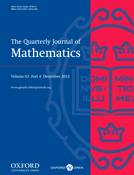
QUARTERLY JOURNAL OF MATHEMATICS
Championing Excellence in Mathematical ScholarshipQuarterly Journal of Mathematics, published by Oxford University Press, stands as a pivotal resource for the mathematical community, focusing on a broad spectrum of topics in the field of mathematics. With its esteemed history dating back to 1930, this journal continues to foster innovative research and discussions, providing a platform for scholars to share their findings and insights. Although the journal currently holds a Q3 classification in mathematics (miscellaneous) and is ranked #207 among general mathematics publications in the Scopus database, its commitment to quality and rigorous peer review ensures that it remains relevant and insightful. Researchers, professionals, and students alike will find the Quarterly Journal of Mathematics an invaluable tool for advancing knowledge and understanding in various mathematical disciplines, making it an essential addition to any academic library.
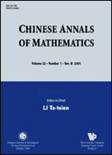
CHINESE ANNALS OF MATHEMATICS SERIES B
Exploring Innovative Theories in MathematicsCHINESE ANNALS OF MATHEMATICS SERIES B, published by Shanghai Scientific Technology Literature Publishing House, is a prominent journal dedicated to fostering research and development in the field of mathematics. With an ISSN of 0252-9599 and an E-ISSN of 1860-6261, this journal provides a platform for the dissemination of innovative mathematical theories and methodologies. As of 2023, it is categorized within the Q4 quartile in *Applied Mathematics* and has achieved a commendable Q3 rank in *Mathematics (miscellaneous)*, emphasizing its growing influence in academia. Despite not being an open-access publication, it serves as a valuable resource for researchers, professionals, and students seeking to explore diverse mathematical topics, particularly from a unique regional perspective. The journal's extensive publication history—from 1980 and continuing to 2024—demonstrates a longstanding commitment to advancing mathematical knowledge and providing insights into various disciplines related to mathematics.
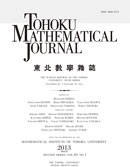
TOHOKU MATHEMATICAL JOURNAL
Fostering Innovation in Mathematical ResearchTOHOKU MATHEMATICAL JOURNAL, published by TOHOKU UNIVERSITY, is a distinguished academic journal committed to the advancement of mathematical research. Established in 1949, the journal has sustained a long-standing tradition of disseminating high-quality, peer-reviewed articles that contribute significantly to various branches of mathematics. With its scope encompassing a broad range of topics within the field, TOHOKU MATHEMATICAL JOURNAL aims to foster intellectual exchange and innovation among mathematicians worldwide. Though currently not an open-access publication, it is indexed in Scopus, holding a respectable Q2 ranking in the miscellaneous mathematics category as of 2023, which signifies its relevance and influence in the academic community. Researchers, professionals, and students alike will find valuable insights and contemporary developments that reflect the journal's dedication to excellence in mathematical scholarship.
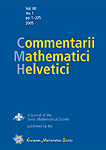
COMMENTARII MATHEMATICI HELVETICI
Advancing Mathematical Frontiers with Open Access InsightsCOMMENTARII MATHEMATICI HELVETICI, published by the EUROPEAN MATHEMATICAL SOCIETY, is a premier open-access journal in the field of mathematics, specifically categorized within the Q1 quartile of miscellaneous mathematics as of 2023. With an ISSN of 0010-2571 and an E-ISSN of 1420-8946, this esteemed journal has a rich history, having commenced its publication journey in 1929 and set to continue until at least 2024. Based in Germany, it provides a valuable platform for original research and significant advancement in mathematical theory and application, appealing to researchers, professionals, and students alike. The journal's commitment to open access since 2022 further enhances its accessibility and outreach, ensuring that cutting-edge mathematical developments are readily available to a global audience. Its Scopus ranking, which places it at the 165th position out of 399 in the general mathematics category (58th percentile), exemplifies its impact and relevance in the academic community.

HOUSTON JOURNAL OF MATHEMATICS
Elevating the Standards of Mathematical InquiryHOUSTON JOURNAL OF MATHEMATICS, published by the University of Houston, serves as a valuable platform for disseminating significant findings in the field of mathematics, specifically within the realm of miscellaneous mathematics. Despite its current categorization in Q4 for 2023, the journal plays a crucial role in fostering academic discussion and exploration among researchers, professionals, and students alike. With its ISSN 0362-1588, the journal has been publishing original research since 1996, with a recent gap filled from 2022 to 2023, thereby continuing to contribute to the mathematical community. While it does not currently offer open access options, the journal's commitment to quality research maintains its relevance within the field and invites submissions that can elevate its standing. Located in the vibrant city of Houston, Texas, the journal not only emphasizes theoretical advancements but also encourages applied mathematical research that intersects with other disciplines, enhancing its significance and reach.
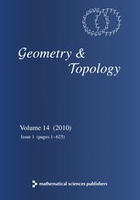
GEOMETRY & TOPOLOGY
Pioneering Research at the Intersection of Shapes and SpacesGeometry & Topology is a leading journal in the field of mathematics, focusing on the intricate relationships between geometric structures and topological spaces. Published by Geometry & Topology Publications in the United Kingdom, this prestigious journal boasts an impressive ranking, placing it in the Q1 quartile for Geometry and Topology as of 2023, with a notable Scopus rank of #13 out of 106, indicating its significant impact within the discipline (88th percentile). With publication years spanning from 1997 to 2024, the journal serves as a vital platform for disseminating high-quality research, fostering advances in both theoretical and applied aspects of the field. While it does not currently operate under an Open Access model, it nevertheless attracts the attention of a diverse audience, including researchers, academics, and students eager to explore innovative methodologies and findings in geometry and topology. The journal’s commitment to excellence makes it an essential resource for anyone passionate about mathematical research.